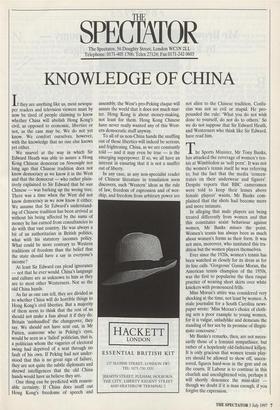The Spectator, 56 Doughty Street, London WC1N 2LL Telephone: 0171-405
1706; Telex 27124; Fax 0171-242 0603
KNOWLEDGE OF CHINA
If they are anything like us, most newspa- per readers and television viewers must by now be tired of people claiming to know whether China will abolish Hong Kong's civil, as opposed to economic, liberties or not, as the case may be. We do not yet know. We comfort ourselves, however, with the knowledge that no one else knows yet either. We marvel at the way in which Sir Edward Heath was able to assure a Hong Kong Chinese democrat on Newsnight not long ago that Chinese tradition does not know democracy as we know it in the West and that the democrat — who rather plain- tively explained to Sir Edward that he was Chinese — was barking up the wrong tree. There was a time when the West did not know democracy as we now know it either. We assume that Sir Edward's understand- ing of Chinese tradition has been arrived at without his being affected by ,the sums of money he has earned from consultancies to do with that vast country. He was always a bit of an authoritarian in British politics, what with his statutory incomes policy. What could be more contrary to Western traditions of freedom than the belief that the state should have a say in everyone's income?
At least Sir Edward can plead ignorance — not that he ever would. China's language and culture are as unknown to him as they are to most other Westerners. Not so the old China hands.
As far as one can tell, they are divided as to whether China will do horrible things to Hong Kong's civil liberties. But a majority of them seem to think that the rest of us should not make a fuss about it if they do. Britain 'mishandled' the changeover, they say. We should not have sent out, in Mr Patten, someone who in Peking's eyes, would be seen as a 'failed' politician, that is, a politician whom the vagaries of electoral swing had deprived of a seat through no fault of his own. If Peking had not under- stood that this is no great sign of failure, they are not quite the subtle diplomats and shrewd intelligences that the old China hands would have us believe they are.
One thing can be predicted with reason- able certainty. If China does snuff out Hong Kong's freedoms of speech and assembly, the West's pro-Peking claque will assure the world that it does not much mat- ter. Hong Kong is about money-making, not least for them. Hong Kong Chinese have never really wanted any of this West- ern democratic stuff anyway.
To all of us non-China hands the snuffing out of those liberties will indeed be serious, and frightening. China, as we are constantly told — and it may even be true — is the emerging superpower. If so, we all have an interest in ensuring that it is not a snuffer out of liberty.
In any case, as any non-specialist reader of Chinese literature in translation soon discovers, such 'Western' ideas as the rule of law, freedom of expression and of wor- ship, and freedom from arbitrary power are not alien to the Chinese tradition. Confu- cius was not so evil or stupid. He pro- pounded the rule: 'What you do not wish done to yourself, do not do to others.' So we do not suppose that Sir Edward Heath, and Westerners who think like Sir Edward, have read him.
The Sports Minister, Mr Tony Banks, has attacked the coverage of women's ten- nis at Wimbledon as 'soft porn'. It was not the women's tennis itself he was referring to, but the fact that the media 'concen- trates on their underwear and figures'. Despite reports that BBC cameramen were told to keep their lenses above female players' waists, Mr Banks com- plained that the shots had become more and more intimate.
In alleging that male players are being treated differently from women and that this constitutes sexist behaviour against women, Mr Banks misses the point. Women's tennis has always been as much about women's forms as their form. It was not men, moreover, who instituted this tra- dition but the women players themselves.
Ever since the 1920s, women's tennis has been watched as closely for its dress as for its line calls. 'Gorgeous' Gussie Moran, the American tennis champion of the 1950s, was the first to popularise the then risque practice of wearing short skirts over white knickers with pronounced frills.
Miss Moran's attire was considered very shocking at the time, not least by women. A male journalist for a South Carolina news- paper wrote: 'Miss Moran's choice of cloth- ing sets a poor example to young women, for it is vulgar, unladylike and demeans the standing of her sex by its promise of illegiti- mate concourse.'
Mr Banks's remarks, then, are not neces- sarily those of a feminist sympathiser, but rather of a hopelessly old-fashioned killjoy. It is only gracious that women tennis play- ers should be allowed to show off, uncen- sored, figures hard-won in the gym and on the courts. If Labour is to continue in this churlish and unenlightened vein, perhaps it will shortly denounce the mini-skirt though we doubt if it is man enough, if you forgive the expression.


























































 Previous page
Previous page